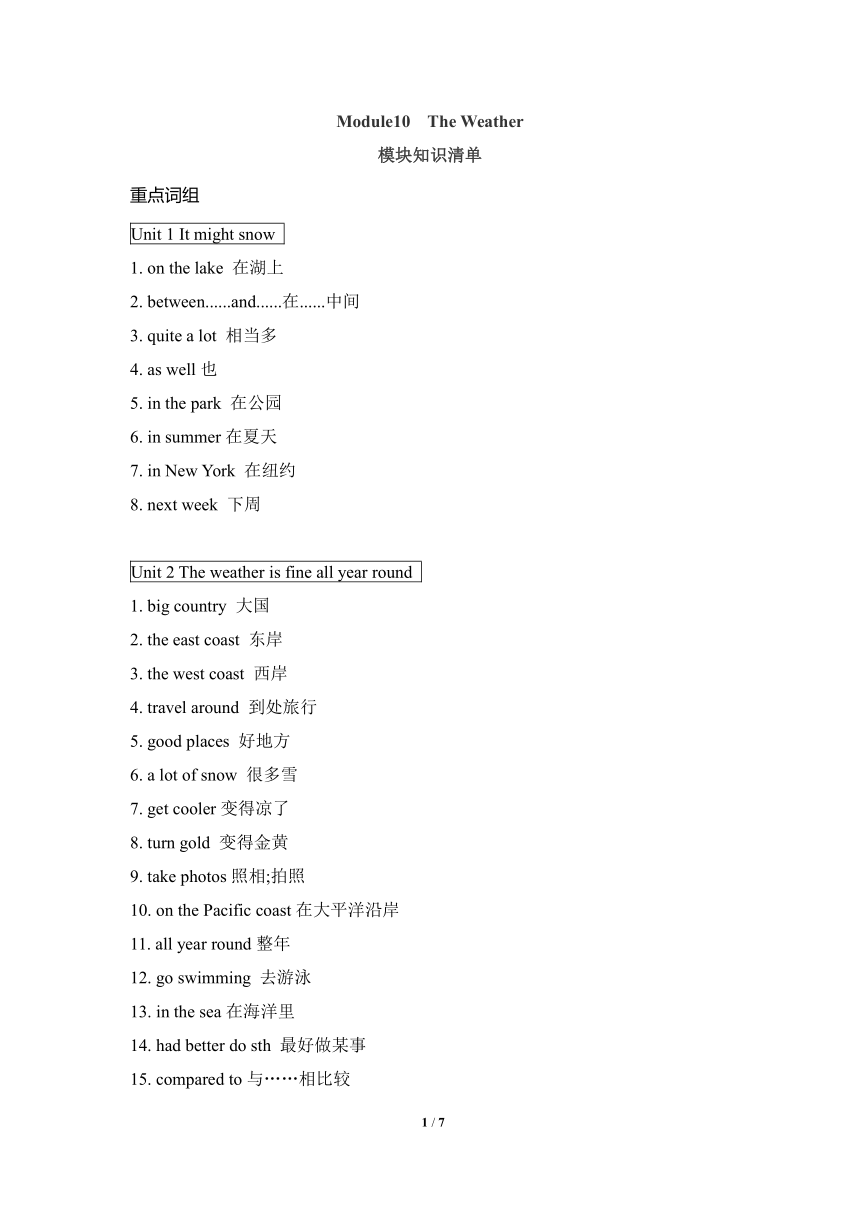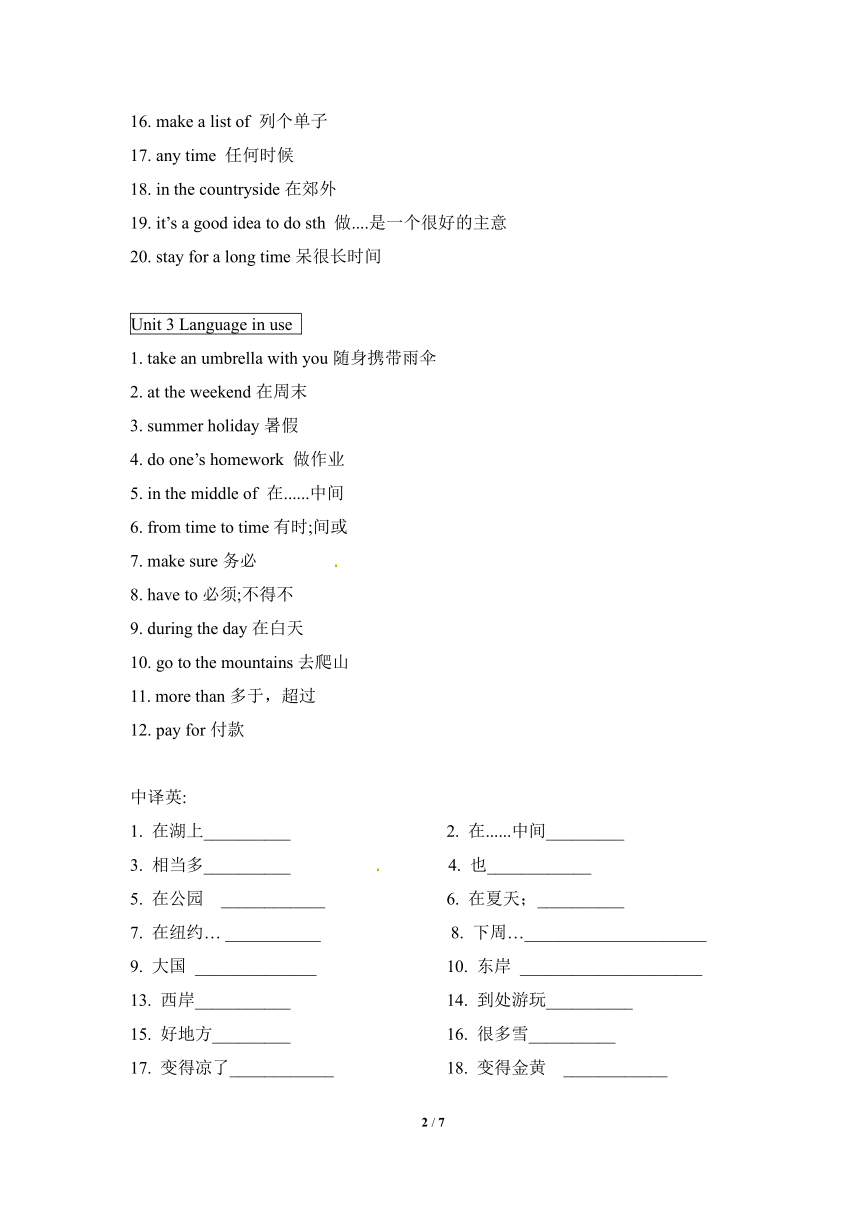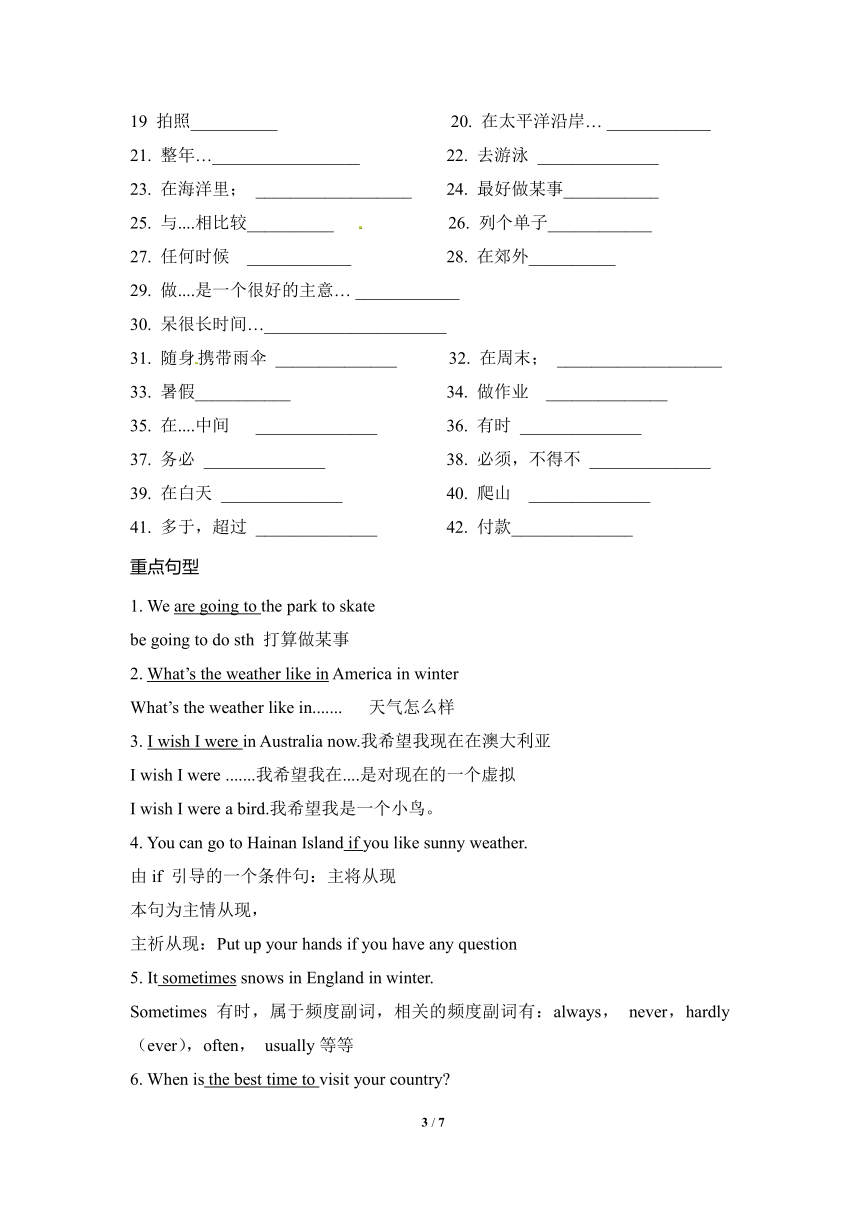Module 10 The weather 模块知识清单
文档属性
| 名称 | Module 10 The weather 模块知识清单 |  | |
| 格式 | doc | ||
| 文件大小 | 93.0KB | ||
| 资源类型 | 教案 | ||
| 版本资源 | 外研版 | ||
| 科目 | 英语 | ||
| 更新时间 | 2022-06-25 15:09:20 | ||
图片预览



文档简介
Module10 The Weather
模块知识清单
重点词组
Unit 1 It might snow
1. on the lake 在湖上
2. between......and......在......中间
3. quite a lot 相当多
4. as well也
5. in the park 在公园
6. in summer在夏天
7. in New York 在纽约
8. next week 下周
Unit 2 The weather is fine all year round
1. big country 大国
2. the east coast 东岸
3. the west coast 西岸
4. travel around 到处旅行
5. good places 好地方
6. a lot of snow 很多雪
7. get cooler变得凉了
8. turn gold 变得金黄
9. take photos照相;拍照
10. on the Pacific coast在大平洋沿岸
11. all year round整年
12. go swimming 去游泳
13. in the sea在海洋里
14. had better do sth 最好做某事
pared to与……相比较
16. make a list of 列个单子
17. any time 任何时候
18. in the countryside在郊外
19. it’s a good idea to do sth 做....是一个很好的主意
20. stay for a long time呆很长时间
Unit 3 Language in use
1. take an umbrella with you随身携带雨伞
2. at the weekend在周末
3. summer holiday暑假
4. do one’s homework 做作业
5. in the middle of 在......中间
6. from time to time有时;间或
7. make sure务必
8. have to必须;不得不
9. during the day在白天
10. go to the mountains去爬山
11. more than多于,超过
12. pay for付款
中译英:
1. 在湖上__________ 2. 在......中间_________
3. 相当多__________ 4. 也____________
5. 在公园 ____________ 6. 在夏天;__________
7. 在纽约… ___________ 8. 下周…_____________________
9. 大国 ______________ 10. 东岸 _____________________
13. 西岸___________ 14. 到处游玩__________
15. 好地方_________ 16. 很多雪__________
17. 变得凉了____________ 18. 变得金黄 ____________
19 拍照__________ 20. 在太平洋沿岸… ____________
21. 整年…_________________ 22. 去游泳 ______________
23. 在海洋里; __________________ 24. 最好做某事___________
25. 与....相比较__________ 26. 列个单子____________
27. 任何时候 ____________ 28. 在郊外__________
29. 做....是一个很好的主意… ____________
30. 呆很长时间…_____________________
31. 随身携带雨伞 ______________ 32. 在周末; ___________________
33. 暑假___________ 34. 做作业 ______________
35. 在....中间 ______________ 36. 有时 ______________
37. 务必 ______________ 38. 必须,不得不 ______________
39. 在白天 ______________ 40. 爬山 ______________
41. 多于,超过 ______________ 42. 付款______________
重点句型
1. We are going to the park to skate
be going to do sth 打算做某事
2. What’s the weather like in America in winter
What’s the weather like in....... 天气怎么样
3. I wish I were in Australia now.我希望我现在在澳大利亚
I wish I were .......我希望我在....是对现在的一个虚拟
I wish I were a bird.我希望我是一个小鸟。
4. You can go to Hainan Island if you like sunny weather.
由if 引导的一个条件句:主将从现
本句为主情从现,
主祈从现:Put up your hands if you have any question
5. It sometimes snows in England in winter.
Sometimes 有时,属于频度副词,相关的频度副词有:always, never,hardly(ever),often, usually等等
6. When is the best time to visit your country
the best time to.....做......最好的时间是
the best place to do sth 做.....最好的地方是
7. It is about 3000 miles from the east coast to the west coast
From.....to...从,.....到......
From Monday to Friday 从周一到周五
the east coast 东岸
the west coast 西岸
8. The weather gets cooler, and the green leaves start to turn gold
get cooler变得凉了
turn gold 变得金黄
start to do sth /start doing sth 开始做某事= begin to do sth /begin doing sth
9. Take your swimming clothes because you might want to go swimming in the sea, even in December.
Might 是情态动词,可能性较小
Because +句子
He was late for school because he was ill.
Because of +短语
He was late for school because of his illness.
go swimming in the sea 在海里游泳
10. There are storms from time to time in summer.
There be 句型,就近原则
from time to time有时;间或
from.....to.....从.......到.......
重点语法点
情态动词
情态动词本身有各种意义,但不能单独作谓语,只能和主要动词一起构成谓语,表示说话人的语气和情态,这样的动词称为情态动词。情态动词没有人称和数的变化。
常用的情态动词有can, could, may, might, will, would, should, must, need, dare等。
1. 情态动词may /might 的用法
(1)表允许,might可以指过去时间,也可指现在时间,语气更委婉。
You may take whatever you like. 你喜欢什么就拿什么。
May (Might) I ask for a photo of your baby 我可以要一张你宝宝的照片吗?
在回答以may引起的问句时,多避免用这个词,而用其它方式,如Yes, please. / Certainly. / Please don’t. / You’d better not. / No, you mustn’t.等,以免显得太严峻或不客气。
(2)表示推测可能(不用于疑问句)
He may be busy now.
2.must, have to的用法
(1)两词都是“必须”的意思,have to 表示客观的需要,must 表示说话人主观上的看法,即主观上的必要。
My brother was very ill, so I had to call the doctor in the middle of the night.
我弟弟病得很厉害,我只得半夜里把医生请来。(客观上需要做这件事)
He said that they must work hard. 他说他们必须努力工作。(主观上要做这件事)
(2)have to有人称、数、时态的变化,而must只有一种形式。
He had to look after his sister at home yesterday. 昨天他不得不在家照看妹妹。
(3)在否定结构中:don't have to 表示“不必”
mustn't 表示“禁止”,
You don't have to tell him about it. 你不一定要把此事告诉他。
You mustn't tell him about it. 你一定不要把这件事告诉他。
(4)must +be+表语,表示推测,它的否定和疑问形式用can代替must。
This must be your pen. 这个一定是你的钢笔。
3. can, could的用法
can的用法
(1)表示能力、许可、可能性。
She can swim fast, but I can’t. 她能游得快,但我不能。
I can see with my eyes. 我能用眼睛看。
(2)表示许可。
You can use my dictionary. 你可以用我的字典。
(3)表示推测,意为“可能”,常用与否定句和疑问句中,此时can’t译为“不可能”。
Can the news be true 这个消息会是真的吗?
注意:can和be able to
两者表示能力时用法相同,但can只有原形和过去式两种形式,在其他时态中要用be able to来表示。另外be able to常常指经过努力,花费了时间和劳力之后才能做到某事。
Jim can’t speak English. 吉姆不会说英语。
I’m sure you’ll be able to finish it quickly. 我相信你能迅速地完成。
could的用法
(1)can的过去式,意为“能、会”,表示过去的能力。
He could write poems when he was 10. 他十岁时就会写诗。
(2)在疑问句中,表示委婉的语气,此时could没有过去的意思。
Could you do me a favor 你能帮我个忙吗?
4. need的用法
既可做实义动词用,又可做情态动词用。作为情态动词,两者都只能用于疑问句,否定句和条件句。 need 作实义动词时后面的不定式必须带to,
(1)实义动词: need (需要, 要求)
need + n. / to do sth
(2)情态动词: need,只用原形,need后加do,否定形式为need not。
Need you go yet
Yes, I must. / No, I needn't.
(3)need后面接doing表示被动:need doing=need to be done。
Your clothes need washing. 你的衣服该洗了。
5. had better的用法
表示“最好”,相当于一个助动词,只有一种形式,后面要跟动词原形。
It is pretty cold. You’d better put on my coat. 天很冷,你最好把我的大衣穿上。
6. can, could, may, might, must都可以表示推测,其用法如下
(1)can, could, may, might, must+动词原形。
表示对现在或将来的情况的推测,此时动词通常为系动词。
I don’t know where she is, she may be in Shenzhen.
(2)can, could, may, might, must+动词现在分词。
表示对现在或正在进行的情况的推测。
At this moment, our teacher must be correcting our exam papers.
(3)can, could, may, might, must+动词过去分词。
表示对过去情况的推测。
We would have finished this work by the end of next December.
(4)推测的否定、疑问形式用can’t, couldn’t表示。
1 / 7
模块知识清单
重点词组
Unit 1 It might snow
1. on the lake 在湖上
2. between......and......在......中间
3. quite a lot 相当多
4. as well也
5. in the park 在公园
6. in summer在夏天
7. in New York 在纽约
8. next week 下周
Unit 2 The weather is fine all year round
1. big country 大国
2. the east coast 东岸
3. the west coast 西岸
4. travel around 到处旅行
5. good places 好地方
6. a lot of snow 很多雪
7. get cooler变得凉了
8. turn gold 变得金黄
9. take photos照相;拍照
10. on the Pacific coast在大平洋沿岸
11. all year round整年
12. go swimming 去游泳
13. in the sea在海洋里
14. had better do sth 最好做某事
pared to与……相比较
16. make a list of 列个单子
17. any time 任何时候
18. in the countryside在郊外
19. it’s a good idea to do sth 做....是一个很好的主意
20. stay for a long time呆很长时间
Unit 3 Language in use
1. take an umbrella with you随身携带雨伞
2. at the weekend在周末
3. summer holiday暑假
4. do one’s homework 做作业
5. in the middle of 在......中间
6. from time to time有时;间或
7. make sure务必
8. have to必须;不得不
9. during the day在白天
10. go to the mountains去爬山
11. more than多于,超过
12. pay for付款
中译英:
1. 在湖上__________ 2. 在......中间_________
3. 相当多__________ 4. 也____________
5. 在公园 ____________ 6. 在夏天;__________
7. 在纽约… ___________ 8. 下周…_____________________
9. 大国 ______________ 10. 东岸 _____________________
13. 西岸___________ 14. 到处游玩__________
15. 好地方_________ 16. 很多雪__________
17. 变得凉了____________ 18. 变得金黄 ____________
19 拍照__________ 20. 在太平洋沿岸… ____________
21. 整年…_________________ 22. 去游泳 ______________
23. 在海洋里; __________________ 24. 最好做某事___________
25. 与....相比较__________ 26. 列个单子____________
27. 任何时候 ____________ 28. 在郊外__________
29. 做....是一个很好的主意… ____________
30. 呆很长时间…_____________________
31. 随身携带雨伞 ______________ 32. 在周末; ___________________
33. 暑假___________ 34. 做作业 ______________
35. 在....中间 ______________ 36. 有时 ______________
37. 务必 ______________ 38. 必须,不得不 ______________
39. 在白天 ______________ 40. 爬山 ______________
41. 多于,超过 ______________ 42. 付款______________
重点句型
1. We are going to the park to skate
be going to do sth 打算做某事
2. What’s the weather like in America in winter
What’s the weather like in....... 天气怎么样
3. I wish I were in Australia now.我希望我现在在澳大利亚
I wish I were .......我希望我在....是对现在的一个虚拟
I wish I were a bird.我希望我是一个小鸟。
4. You can go to Hainan Island if you like sunny weather.
由if 引导的一个条件句:主将从现
本句为主情从现,
主祈从现:Put up your hands if you have any question
5. It sometimes snows in England in winter.
Sometimes 有时,属于频度副词,相关的频度副词有:always, never,hardly(ever),often, usually等等
6. When is the best time to visit your country
the best time to.....做......最好的时间是
the best place to do sth 做.....最好的地方是
7. It is about 3000 miles from the east coast to the west coast
From.....to...从,.....到......
From Monday to Friday 从周一到周五
the east coast 东岸
the west coast 西岸
8. The weather gets cooler, and the green leaves start to turn gold
get cooler变得凉了
turn gold 变得金黄
start to do sth /start doing sth 开始做某事= begin to do sth /begin doing sth
9. Take your swimming clothes because you might want to go swimming in the sea, even in December.
Might 是情态动词,可能性较小
Because +句子
He was late for school because he was ill.
Because of +短语
He was late for school because of his illness.
go swimming in the sea 在海里游泳
10. There are storms from time to time in summer.
There be 句型,就近原则
from time to time有时;间或
from.....to.....从.......到.......
重点语法点
情态动词
情态动词本身有各种意义,但不能单独作谓语,只能和主要动词一起构成谓语,表示说话人的语气和情态,这样的动词称为情态动词。情态动词没有人称和数的变化。
常用的情态动词有can, could, may, might, will, would, should, must, need, dare等。
1. 情态动词may /might 的用法
(1)表允许,might可以指过去时间,也可指现在时间,语气更委婉。
You may take whatever you like. 你喜欢什么就拿什么。
May (Might) I ask for a photo of your baby 我可以要一张你宝宝的照片吗?
在回答以may引起的问句时,多避免用这个词,而用其它方式,如Yes, please. / Certainly. / Please don’t. / You’d better not. / No, you mustn’t.等,以免显得太严峻或不客气。
(2)表示推测可能(不用于疑问句)
He may be busy now.
2.must, have to的用法
(1)两词都是“必须”的意思,have to 表示客观的需要,must 表示说话人主观上的看法,即主观上的必要。
My brother was very ill, so I had to call the doctor in the middle of the night.
我弟弟病得很厉害,我只得半夜里把医生请来。(客观上需要做这件事)
He said that they must work hard. 他说他们必须努力工作。(主观上要做这件事)
(2)have to有人称、数、时态的变化,而must只有一种形式。
He had to look after his sister at home yesterday. 昨天他不得不在家照看妹妹。
(3)在否定结构中:don't have to 表示“不必”
mustn't 表示“禁止”,
You don't have to tell him about it. 你不一定要把此事告诉他。
You mustn't tell him about it. 你一定不要把这件事告诉他。
(4)must +be+表语,表示推测,它的否定和疑问形式用can代替must。
This must be your pen. 这个一定是你的钢笔。
3. can, could的用法
can的用法
(1)表示能力、许可、可能性。
She can swim fast, but I can’t. 她能游得快,但我不能。
I can see with my eyes. 我能用眼睛看。
(2)表示许可。
You can use my dictionary. 你可以用我的字典。
(3)表示推测,意为“可能”,常用与否定句和疑问句中,此时can’t译为“不可能”。
Can the news be true 这个消息会是真的吗?
注意:can和be able to
两者表示能力时用法相同,但can只有原形和过去式两种形式,在其他时态中要用be able to来表示。另外be able to常常指经过努力,花费了时间和劳力之后才能做到某事。
Jim can’t speak English. 吉姆不会说英语。
I’m sure you’ll be able to finish it quickly. 我相信你能迅速地完成。
could的用法
(1)can的过去式,意为“能、会”,表示过去的能力。
He could write poems when he was 10. 他十岁时就会写诗。
(2)在疑问句中,表示委婉的语气,此时could没有过去的意思。
Could you do me a favor 你能帮我个忙吗?
4. need的用法
既可做实义动词用,又可做情态动词用。作为情态动词,两者都只能用于疑问句,否定句和条件句。 need 作实义动词时后面的不定式必须带to,
(1)实义动词: need (需要, 要求)
need + n. / to do sth
(2)情态动词: need,只用原形,need后加do,否定形式为need not。
Need you go yet
Yes, I must. / No, I needn't.
(3)need后面接doing表示被动:need doing=need to be done。
Your clothes need washing. 你的衣服该洗了。
5. had better的用法
表示“最好”,相当于一个助动词,只有一种形式,后面要跟动词原形。
It is pretty cold. You’d better put on my coat. 天很冷,你最好把我的大衣穿上。
6. can, could, may, might, must都可以表示推测,其用法如下
(1)can, could, may, might, must+动词原形。
表示对现在或将来的情况的推测,此时动词通常为系动词。
I don’t know where she is, she may be in Shenzhen.
(2)can, could, may, might, must+动词现在分词。
表示对现在或正在进行的情况的推测。
At this moment, our teacher must be correcting our exam papers.
(3)can, could, may, might, must+动词过去分词。
表示对过去情况的推测。
We would have finished this work by the end of next December.
(4)推测的否定、疑问形式用can’t, couldn’t表示。
1 / 7
同课章节目录
- Module 1 How to learn English
- Unit 1 Let's try to speak English as much as possi
- Unit 2 You should smile at her.
- Unit 3 Language in use .
- Module 2 My home town and my country
- Unit 1 It's taller than many other buildings.
- Unit 2 Cambridge is a beautiful city in the east o
- Unit 3 Language in use .
- Module 3 Sports.
- Unit 1 Nothing is more exciting than playing tenni
- Unit 2 This year we training more carefully.
- Unit 3 Language in use .
- Module 4 Planes, ships and trains .
- Unit 1 He lives the farthest from school.
- Unit 2 What is the best way to travel.
- Unit 3 Language in use .
- Module 5 Lao She Teahouse.
- Unit 1 I wanted to see the Beijing Opera.
- Unit 2 It descibes the changes in Chinese society.
- Unit 3 Language in use .
- Module 6 Animals in danger.
- Unit 1 It allows people to get closer to them .
- Unit 2 The WWF is working hard to save them all.
- Unit 3 Language in use .
- Revision module A
- Module 7 A famous story
- Unit 1 Alice was sitting with her sister by the ri
- Unit 2 She was thinking about her cat.
- Unit 3 Language in use .
- Module 8 Accidents
- Unit 1 While the car were changing to red, a car s
- Unit 2 I was trying to pick it up when it bite me
- Unit 3 Language in use .
- Module 9 Population
- Unit 1 The population of China is about 1.37 billi
- Unit 2 Arnwick was a city with 200,000 people.
- Unit 3 Language in use .
- Module 10 The weathe
- Unit 1 It might snow.
- Unit 2 The weather is fine all year round.
- Unit 3 Language in use .
- Module 11 Way of life
- Unit 1 In China ,we open a gift later.
- Unit 2 In England, you usually drink tea with milk
- Unit 3 Language in use .
- Module 12 Help
- Unit 1 What should we do before help arrives?
- Unit 2 Stay away from windows and heavy furniture.
- Unit 3 Language in use .
- Revision module B
